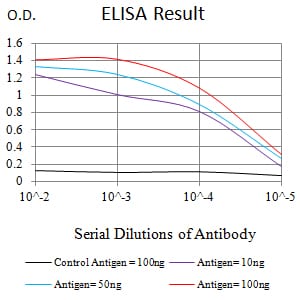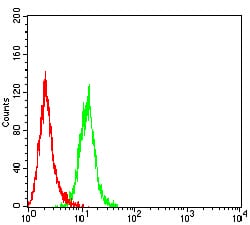

| WB | 咨询技术 | Human,Mouse,Rat |
| IF | 咨询技术 | Human,Mouse,Rat |
| IHC | 咨询技术 | Human,Mouse,Rat |
| ICC | 技术咨询 | Human,Mouse,Rat |
| FCM | 1/200 - 1/400 | Human,Mouse,Rat |
| Elisa | 1/10000 | Human,Mouse,Rat |
| Aliases | GIG3; MORT1 |
| Entrez GeneID | 8772 |
| clone | 5A6A2 |
| WB Predicted band size | 23.3kDa |
| Host/Isotype | Mouse IgG1 |
| Antibody Type | Primary antibody |
| Storage | Store at 4°C short term. Aliquot and store at -20°C long term. Avoid freeze/thaw cycles. |
| Species Reactivity | Human |
| Immunogen | Purified recombinant fragment of human FADD (AA: 20-150) expressed in E. Coli. |
| Formulation | Purified antibody in PBS with 0.05% sodium azide |
+ +
以下是关于FADD抗体的3篇经典参考文献,涵盖功能研究和应用场景:
---
1. **文献名称**:*FADD, a novel death domain-containing protein, interacts with the death domain of Fas and initiates apoptosis*
**作者**:Chinnaiyan AM, et al.
**摘要**:该研究首次鉴定了FADD蛋白,揭示了其通过死亡结构域与Fas受体结合,并证明其在Fas介导的凋亡信号中的核心作用。实验中利用FADD抗体验证了其与Fas的相互作用,为凋亡通路机制奠定基础。
2. **文献名称**:*FADD: Essential for embryo development and signaling from some, but not all, inducers of apoptosis*
**作者**:Yeh WC, et al.
**摘要**:通过构建FADD基因敲除小鼠,研究发现FADD缺失导致胚胎期死亡及心脏发育异常,证实其在发育中不可或缺。研究使用FADD抗体进行组织免疫染色,显示其在心肌细胞中的表达模式。
3. **文献名称**:*Requirement for FADD in T cell activation and NF-κB activation*
**作者**:Zhang J, et al.
**摘要**:该文发现FADD缺陷的T细胞虽抵抗激活诱导的凋亡,但NF-κB信号和增殖能力增强,提示FADD在凋亡之外的调控功能。研究中通过FADD抗体进行Western blot分析,验证了蛋白表达缺失对信号通路的影响。
---
**注**:上述文献发表于1995-2000年间,聚焦FADD的分子机制与功能验证,抗体多用于蛋白互作、组织定位及表达水平检测,适用于凋亡、发育及免疫领域研究。
FADD (Fas-associated protein with death domain) is a pivotal adaptor protein involved in programmed cell death (apoptosis) and inflammatory signaling. Structurally, it contains a C-terminal death domain (DD) that mediates interactions with death receptors like Fas (CD95), TRAIL receptors, and TNFR1. as well as an N-terminal death effector domain (DED) responsible for recruiting initiator caspases (e.g., caspase-8/10). Upon receptor activation, FADD oligomerizes to form the death-inducing signaling complex (DISC), triggering caspase activation and apoptosis. Beyond apoptosis, FADD participates in non-apoptotic processes, including cell cycle regulation, proliferation, autophagy, and necroptosis, through interactions with other signaling molecules like RIPK1 and TRADD.
FADD dysregulation is implicated in cancer, autoimmune disorders, and neurodegenerative diseases. For instance, reduced FADD expression may promote tumor survival, while excessive FADD activity can drive inflammatory pathologies. FADD-specific antibodies are essential tools for studying its expression, localization, and interactions in these contexts. They are widely used in techniques such as Western blotting, immunohistochemistry, and co-immunoprecipitation to elucidate FADD's role in health and disease. Research utilizing FADD antibodies continues to advance understanding of cell death mechanisms and therapeutic strategies targeting apoptosis-related pathways.
×